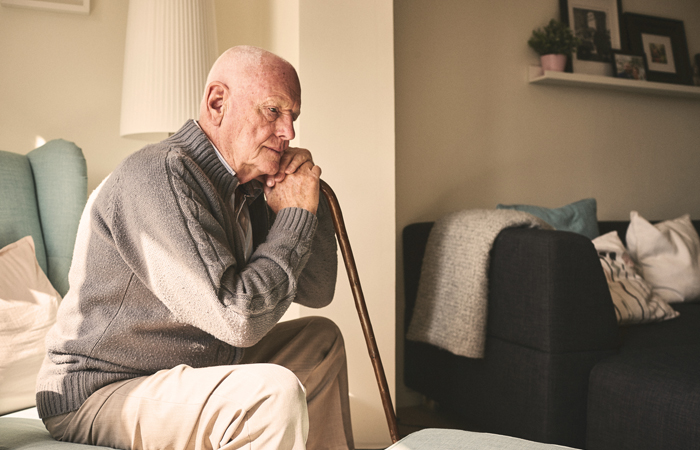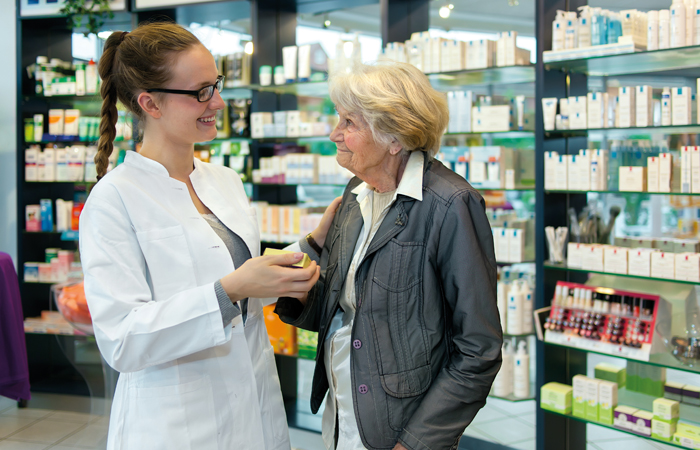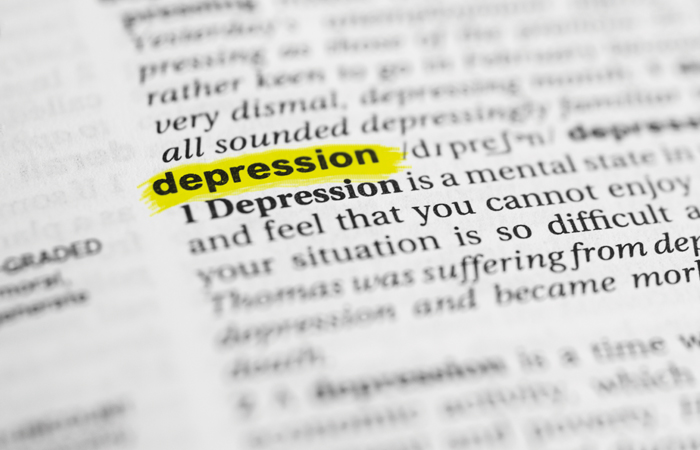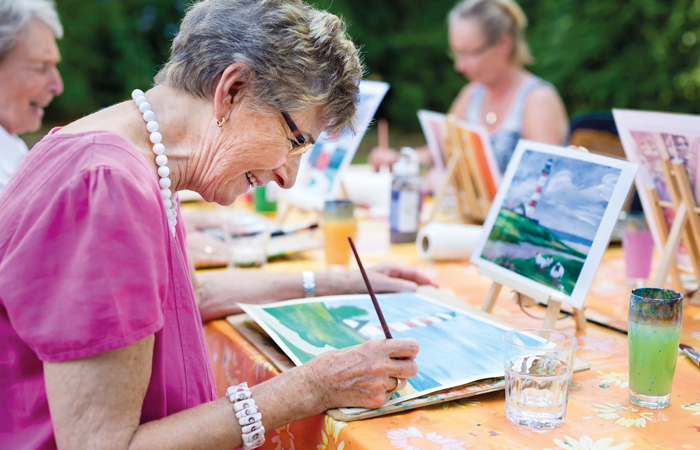Only lonely on the inside
In Population Health
Follow this topic
Bookmark
Record learning outcomes
Loneliness in older age is often a reality but is by no means inevitable or absolute. Pharmacy teams are ideally placed to offer support and signposting
Loneliness is increasingly being recognised as one of the most important public health issues of modern times. In June 2019, the Government launched a new ‘Let’s Talk Loneliness’ campaign to tackle the stigma around feeling alone and encourage people to build more meaningful conversations to help stop them feeling so isolated. As part of Loneliness Awareness Week, also in June, the Government announced a partnership with the Co-op Foundation to match-fund a new £1.6 million initiative that supports activity in community spaces to promote social connections.

While loneliness can affect people of all ages, it can be harder to overcome in the older age groups. According to Age UK, there are 1.4 million chronically lonely older people in England, and many more across the rest of the UK. Older people are more likely to face life-changing events like retirement, long-term illness or bereavement, and getting older is consistently recognised as a trigger for feelings of loneliness and experiences of social isolation. Research shows that loneliness can be as bad for people’s health as obesity or smoking.
While older women are more likely than older men to report feeling lonely, men often experience loneliness too. The two-year Older Men at the Margins study, led by the University of Bristol in collaboration with Age UK, has highlighted the issues felt by older men from different social backgrounds and circumstances and how these can impact negatively on day-to-day life. To combat the problem of loneliness and social isolation, especially in older men, researchers at the University are calling for changes to the focus of adult social care services – with more group support and, in particular, inclusive tailored groups for older men in marginalised communities.
Those at risk
As people get older, their social networks often shrink and social activities may become limited by reduced income or reduced mobility. Some people take up new activities – from sports and art to culture and volunteering – but may still feel lonely or be at increased risk of social isolation. Three particular life events associated with social isolation among older people are: retirement and losing connection with colleagues; falling ill and becoming less mobile; and a spouse dying or going into care.
According to research published in January 2019 in the BMC Public Health journal on associations between social isolation, loneliness and objective physical activity in older men and women, social isolation and loneliness are two separate concerns.
- Social isolation: the absence of regular contact with family and friends and lack of involvement in social organisations
- Loneliness: the subjective experience or perception of being isolated.
There are 1.4 million chronically lonely older people in England, and many more across the rest of the UK
According to Age UK, the number of over-50s suffering from loneliness is set to reach two million by 2025/6 due to a rising number of older people. This compares to around 1.4 million in 2016/7 – a 49 per cent increase in 10 years. Unfortunately, older men who live alone are more likely to be socially isolated than their female counterparts, having less regular contact with family and friends, and this can exacerbate feelings of loneliness.
Certain groups of older people may be more prone than others to social isolation. Levels of loneliness may be higher in people from, for example, ethnic minorities due to language barriers and people with higher levels of poverty. These groups are often also less likely to access health and social care services. The Older Men at the Margins study focused on older men from seldom-heard groups, including men who were single or living alone in rural and urban areas, men who were carers for loved ones, men living with hearing loss, and gay men who were single or living alone.
Growing health concern
“Some people choose to be alone and live happily without much social contact, while others may have lots of people around them and still feel lonely,” says Stephen Buckley, head of information at mental health charity Mind. “Loneliness isn’t a mental health problem, but it’s linked to mental health. Feeling lonely can contribute to developing things like anxiety and depression, while people living with mental health problems are more likely to feel lonely. If you’re feeling low or anxious, you might feel like withdrawing from loved ones and it can be difficult to reach out to others. A disconnect between the relationships we think we want, or perceive others to have, and those we actually have – can add more pressure and make us feel worse.”
Loneliness has been linked to an increased risk of coronary heart disease and stroke, depression, cognitive decline and Alzheimer’s disease. It can also contribute to psychological stress, higher blood pressure and sleep problems. Research published by The Health Foundation in December 2018 to look at the healthcare needs of older adults revealed that people aged 65 and older who live alone are 50 per cent more likely to go to A&E than those who live with someone else. They are also at increased risk of being admitted to hospital as an inpatient and are also more likely to visit their GP.
“For a growing number of people, particularly those in later life, loneliness can define their lives and have a significant impact on their wellbeing,” says Dr Paul Willis, from the University of Bristol’s School for Policy Studies, who led the research. “Because loneliness occurs when people’s ability to engage with others is inhibited, helping people cope with and overcome these feelings is vital. Our research has shown the importance of groups and networks in older men’s lives, especially those run by voluntary and third sector organisations. Support for such groups needs to be given greater priority by local authorities, both in terms of support from social workers and long-term funding.”
If a customer is housebound, their pharmacy delivery may be the only outside contact they have in a week

Community support
Loneliness and social isolation can’t be treated with medicines or a referral for hospital treatment, yet they must be addressed. In May 2018, the Royal College of General Practitioners (RCGPs) published an action plan setting out how loneliness may be tackled, as GPs across the UK see millions of lonely and socially isolated patients each year.
“Loneliness is not a medical condition, but it can affect our patients’ health,” says Professor Helen Stokes-Lampard, chair of the RCGP. “It can also have a real impact on workload pressures in general practice and the wider NHS, at a time when the whole system is facing intense resource and workforce challenges. GPs are at the forefront of patient care, at the heart of communities, and we see many people whose underlying problem isn’t medical in our surgeries every day. But tackling loneliness, and helping patients who might be at risk of becoming lonely through social isolation, can’t all come down to GPs and our teams. We need a society-wide approach to address this growing epidemic.”
Jolie Goodman, spokesperson for the Mental Health Foundation, says that much of the work by the charity’s Later Life Team is about building social connections. “Two million people in England over the age of 75 live alone and more than a million older people report going for more than a month at a time without speaking to a friend or family member,” she says. “Community pharmacists can be a crucial link to the wider community for people in later life. If you make time to have a conversation and even have local community activities up your sleeve, that can make a huge difference for someone who is lonely.”
Local pharmacies are an important part of the community, especially for older people, so are well-placed to help tackle loneliness and social isolation. There is no one-size-fits-all approach, as this will depend on the individual pharmacy, time, space and staff availability. “Many of the triggers or risk factors for loneliness are things that community pharmacies are there to help with,” says Lucy Harmer, director of services at older people’s charity Independent Age. “For example, ill health, declining mobility, or falls can all make it hard to get out and about and can increase isolation. Many older people who are lonely may be frequent visitors to a pharmacy – a staff member may be the only person they talk to on a given day, which means they could need to be referred to a service like ours.”

Pharmacy help
Identifying customers who may be lonely, and broaching what is likely to be a sensitive conversation, may not be easy. “Most customers won’t admit that they are lonely or struggling,” says Reena Barai, superintendent pharmacist at SG Barai Pharmacy in Sutton, south-west London. “You may notice they come into the pharmacy very regularly as an outing for them. [Pharmacy staff] could start a conversation by asking what a customer’s daily life is like, especially if they recognise some of the signs and symptoms of loneliness. Often people may talk about the activities they do at home, such as reading or watching television, not realising that it’s important to be physically and mentally socially active as well. If a customer is housebound, their pharmacy delivery may be the only outside contact they have in a week. Find out what is available in the local area in terms of agencies, charities and organisations and encourage older customers to contact them. These are also key messages that can help to prevent dementia.”
The pharmacy team may be more likely to notice signs of loneliness or isolation in certain customers, especially if they have known them for a long time. “The community pharmacy team often know customers by their first names and may spot changes in their appearance or mannerisms,” says Sudhir Sehrawat, Royal Pharmaceutical Society Welsh Board member and community pharmacist. “If pharmacies are making deliveries to people’s homes, or conducting an MUR there, a lot can be fed back to the pharmacist in store. Looking at compliance of medication may identify factors that could contribute to loneliness, such as a lack of involvement by family or friends, any disabilities or sight or hearing problems. Bereavement is one of the biggest triggers but also if families live away and can’t offer any support. In rural areas, the risk of loneliness can be huge.”
Susanne Haar, superintendent pharmacist at Nelsons, adds that making time for customers is important, as well as encouraging older people to connect with their local community through a library, club, group or volunteering organisation. “As a community healthcare professional, I try to have time for my customers on the phone or over the counter,” she says. “We are all busy but spending a few minutes listening can help them out of their loneliness. I also call some of our elderly customers to check how they are doing. They are always so appreciative and grateful. Many pharmacies have noticeboards displaying activities in the local community. Encouraging older customers to check these out when they go to pick up their prescriptions can give them some inspiration on activities they can do with others. If they are computer literate and can’t get out of the house, they may want to interact with people on Skype and social media.”
Social prescribing

On 15 October 2018, the Government announced a new strategy for tackling loneliness, with plans to roll out ‘social prescribing’ across England by 2023. This will enable GPs to refer lonely patients to community ‘link workers’ who will have the time to identify people’s specific needs, whether this involves practical and/or emotional support. Funding will be provided to connect patients with a range of community activities, such as cookery classes, walking clubs and art groups. According to a report by the Royal College of General Practitioners in May 2018, every GP surgery “should be funded to have access to a dedicated social prescriber in a bid to tackle crippling GP workload, and free up their time for those patients most in need of medical care”.
This tailor-made support will mean doctors can try to improve their patients’ health, wellbeing and quality of life through activities rather than medicines, where appropriate. Many of these activities already exist, provided by the voluntary and community sector, but patients may not know how to access them or may not be able to afford them. Pharmacies and other healthcare professionals, as well local agencies, will also be able to refer people to link workers.
The Government is also trialling a partnership with Royal Mail in Liverpool, New Malden and Whitby. The scheme will get postal workers to check in on isolated people and help them link up with their communities or family as part of delivery rounds. The Government also intends to transform underused areas and create new community cafés, arts spaces and gardens.
Find out what’s available for older people in your community and keep a file of information close to hand in the pharmacy for the team to pass on to customers.
